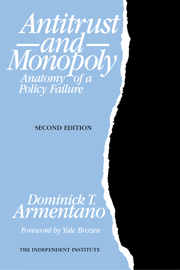Homeowners require affordable property insurance to obtain mortgages and to protect their investments. Yet in many hurricane–affected states, property insurance rates have skyrocketed, making coverage all but unaffordable. In addition, some important private insurance carriers have dropped coverage entirely in certain states. And ironically, recent state government attempts to remedy the situation have been halfhearted at best, and counterproductive at worst.
Take the state of Florida. In January, the Florida legislature required that Citizens Insurance, the state–owned company that now insures more than 20% of the property in Florida, reduce its prices to be more “competitive” with private insurance rates. Second, the state legislated a “rollback” of private insurance rates for 2007 on the order of 25% from current levels. Finally, the state’s Florida Hurricane Catastrophe Fund (FHCF) was expanded to provide lower reinsurance rates for private insurance companies that may allow them to lower premiums for policyholders.
Now all of this sounds good for homeowners, but will these changes really lower prices and increase property insurance availability? The history of the state–regulated property insurance industry make this very doubtful.
The U.S. property/casualty insurance industry is private, but it is regulated by various insurance commissions at the state level. (The McCarran–Ferguson Act of 1945 exempts the industry from federal regulation, including antitrust). Yet to say that the states “regulate” insurance rates has always been ambiguous. What actually happens in most states (including Florida) is that the insurance industry “rate bureaus” collect “loss” experience information (say, on fires), and then suggest “advisory” rates for member companies. These companies then file these advisory rates (prices) and policy requirements with the various state insurance commissions under the so–called “file and use” approach. Normally these industry–determined prices and price changes automatically go into effect unless directly challenged by the state insurance regulators. Recently these challenges have become more frequent, and direct price regulation over the companies has expanded.
The problem with direct government setting of insurance prices (or any prices) has been known to economists for decades. Setting prices too low by law will simply lead insurance carriers to withdraw from the market and exacerbate the availability problem: price controls cause shortages. It has happened with automobile insurance (e.g., Massachusetts), and it is happening now with homeowner coverage in several of the hurricane–affected states. Rolling back prices by law is no long–run solution.
The legislative changes enacted in January are unlikely to achieve their objectives. First, the price rollbacks and increasing government and judicial control over the insurance business will create incentives for private firms to leave the Florida property insurance market. Second, Citizens Insurance, initially designed as an “insurer of last resort,” will increasingly become the insurer of “first” resort and do even more business at the state–mandated lower rates. Third, Citizens, which lost a ton of money charging “high” prices, will lose even more money charging lower rates; thus the risks for property losses will be shifted increasingly to those homeowners without losses, through increasing surcharges on their policies. Finally, the reinsurance changes are unlikely to have any major effect on private insurance firms already bent on leaving the market.
My recommendation? Create appropriate economic and legal incentives for existing companies to stay and for new companies to enter the market, by deregulating the entire property/casualty insurance market. Remove any legal barriers to entry. End all insurance commission and legislative price fixing of insurance products. Phase out all governmental regulation of the insurance policy contracts, and require that the courts enforce—not amend—legitimate contracts between insurance companies and policyholders. In short, move to create an open and legally secure market for selling property and casualty insurance in Florida. How can this possibly be worse than the current fiasco?








